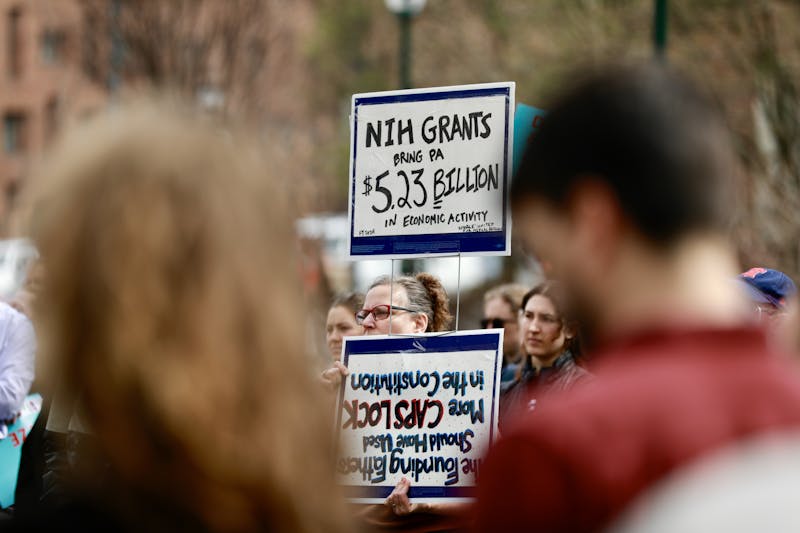
I sat and watched the testimony of Condoleezza Rice in front of the Sept. 11 Commission last week and admired that this was a testimony of loyalty and support. Evident in Rice's testimony was the reality that in her position, she must support the determinations and decisions of both the president and her administration. Generally speaking, the words that were chosen, the tone in which she presented those words and the claims she made were all organized into an unwavering defense of the administration's past decisions around Sept. 11.
Though I appreciated this position, the testimony was ridiculous. Clear throughout this testimony: The truth was in the mix.
There were two things that were evident in Rice's testimony last week. First and foremost, the administration screwed up. As her testimony followed that of Penn alumnus Richard Clarke, we as viewers had already established in our minds the reality that information about al Qaeda's intentions had reached her level, and awareness had been raised.
On Aug. 6, 2001, George W. Bush received his presidential daily briefing. According to reports, the briefing described active plots by Osama bin Laden to attack the United States. The word "hijacking" appeared in that briefing.
Rice argued that the Aug. 6 document was a historical document that says, "Here's how you might think about al Qaeda." I dispute the idea that the Aug. 6 document was anything less than detailed information on the current threats to the United States, one of which was al Qaeda. Clear in the revelation of this document was the fact that the United States dropped the ball on a key opportunity to be proactive in protection.
This leads me to my second dispute with this testimony. We were not proactive. Rice made the statement that the country was not on a "war footing" prior to the Sept.11 attacks. Throughout the testimony, and in connection with prior testimonies, it was gradually revealed that the ability to be on a "war footing" was taken away by the administration's lack of proactivity and eminence in defense.
Most compelling in this testimony was panelist John Lehman's line of questioning. Clear from this testimony was the abundance of information that was out there and open for "interpretation"; therefore, there were several opportunities for this administration to take a proactive stance.
Lehman revealed the presence of information about active al Qaeda cells in the United States and said that flight training had proceeded for these individuals. Lehman presented information that for the last 10 years, the FAA had seen data that stated that the U.S. airport security system never was more than 20 percent effective and was usually down around 10 percent for 10 straight years. Lehman noted that up until Sept. 11, it was perfectly permissible to allow 4-inch knife blades aboard planes. Lehman presented question after question, starting with the phrase "Were you aware ..." Rice's continued response: No.
We did not take the initiative to discover the information that was clearly accessible or to act on the information we did have. Proactivity would have been establishing the system of protection we now have at our airports. Proactivity would have been establishing the relationship between the FBI and CIA that Rice explains was nonexistent.
Perhaps this didn't happen because we are the United States of America. We stood upon our pride and alleged strength and proceeded forward, exposed and vulnerable. Now, we respond to our revealed vulnerability by saying, "This time, we are truly strong."
It is not enough to claim, "We now know." Admitting hindsight is not acceptable. At some point, on some level, we have to acknowledge our mistake. Because until that point, we cannot and will not be proactive. From the events of Sept. 11, we now know that preventative action is the only thing that will protect us. It is unfortunate that it took so many lives to force us to come to terms with the Aug. 6 memo, with an accurate interpretation of our strength and with the true necessity of forward thinking.
Rice's testimony did not address this reality; it did not accept an awareness of the administration's responsibility to be proactive. Now we hear in President Bush's verbiage a type of divine right to push forward or to extend our arm into other countries, and I can only believe that this will enhance our vulnerability; our wounds will be left open.
As panelist Bob Kerrey stated, "You obviously don't want to use the M-word in here." Admitting a mistake is never easy. But inherent in the claim that nothing could be done to predict the events of Sept. 11 is the question of whether nothing can be done to predict what will come next.
Darcy Richie is a senior urban studies major from Birmingham, Mich. Strange Fruit appears on Wednesdays.
The Daily Pennsylvanian is an independent, student-run newspaper. Please consider making a donation to support the coverage that shapes the University. Your generosity ensures a future of strong journalism at Penn.
DonatePlease note All comments are eligible for publication in The Daily Pennsylvanian.







